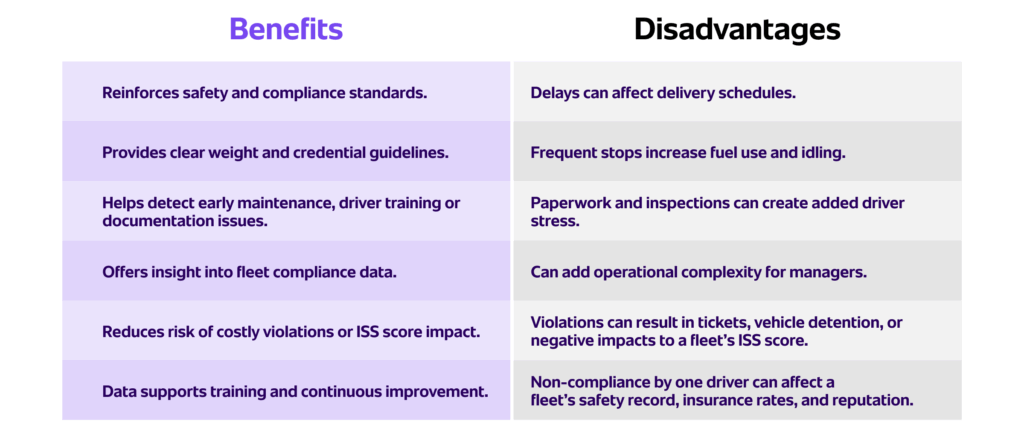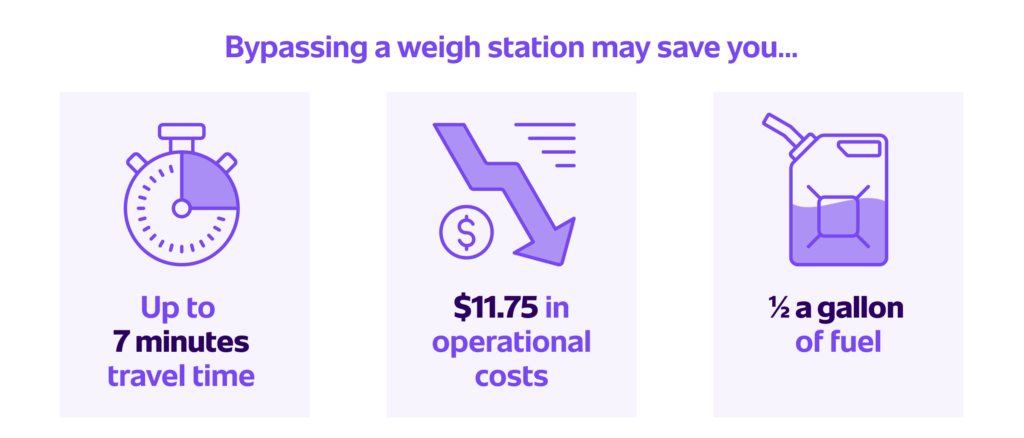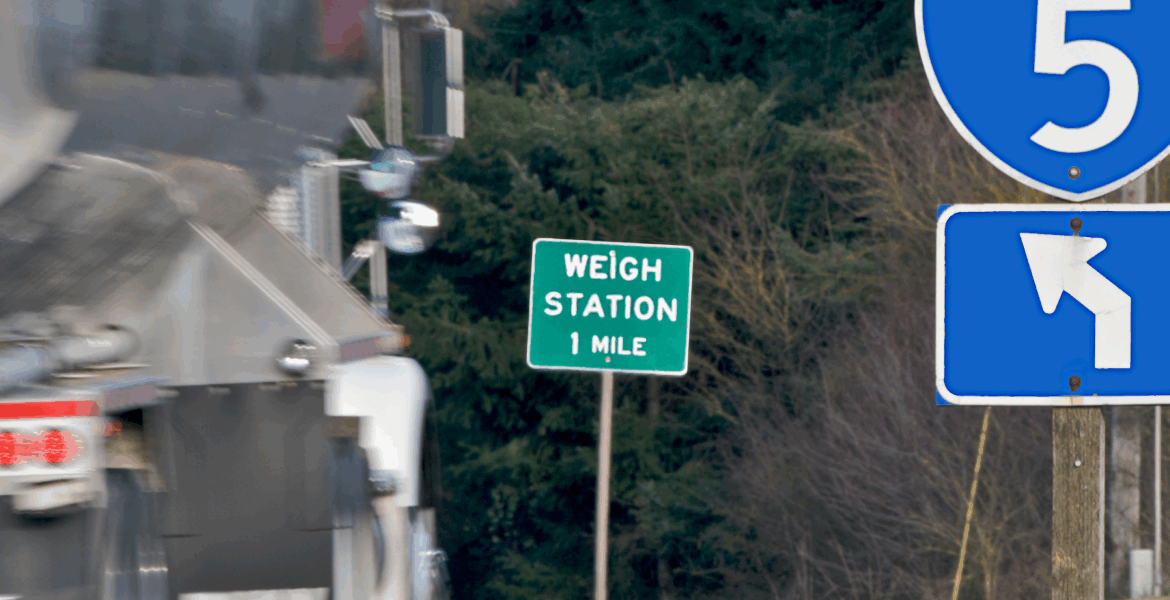Weigh stations are essential to highway safety and commerce. They ensure that commercial motor vehicles comply with state and federal regulations for weight, safety, and credentials. These checkpoints protect infrastructure and help keep America’s highways safe.
For fleets and drivers however, weigh stations can also mean delays, extra fuel use, and added stress. Each unnecessary stop can interrupt momentum, disrupt delivery schedules, and reduce operational efficiency. That’s why more fleets are turning to weigh station bypass—technology that verifies safety and compliance data electronically, allowing qualified trucks to stay on the move.
PrePass has been a part of bypass since the beginning. Working with transportation agencies and enforcement partners, PrePass helped pioneer the nation’s first connected bypass infrastructure. Today, that network allows millions of safe, compliant trucks to bypass weigh stations every day— saving fleets time and money while helping enforcement focus on safety.
What is a weigh station?
A weigh station is a checkpoint along highways where commercial motor vehicles stop so officials can verify weight, credentials, and safety compliance.
Why they’re important.
- Weight enforcement
States enforce legal truck weight limits to prevent damage to roads and bridges and to reduce the risk of tire or brake failure caused by overloading.
- Safety and compliance checks
Inspectors review driver credentials (like CDLs), electronic logs, and vehicle documentation to ensure compliance with the Federal Motor Carrier Safety Administration (FMCSA) and state regulations.
- Safety standards
Enforcement ensures all fleets operate under the same safety and maintenance standards, discouraging unsafe practices.
- Revenue and infrastructure protection
Weigh stations help verify tax payments and protect state investments in infrastructure by reducing wear caused by overweight trucks.
Key takeaway: Weigh stations protect the public, safeguard the road network everyone relies on, and ensure the commercial transportation system runs safely and fairly.
Benefits and Disadvantages of weigh stations.

Penalties for missing a weigh station.
Failing to stop when required is a serious violation.
- Fines and citations: Penalties vary by state/locality and can escalate quickly, often exceeding several hundred dollars per occurrence.
- ISS score impact: Violations increase inspection frequency and, over time, can lower safety scores and bypass eligibility. Positive vehicle inspections can help to positively improve a fleet’s ISS score.
- Fleet-wide consequences: Repeat offenses can result in higher insurance premiums, lost shipper trust, and impoundment.
What counts as a weigh station bypass?
A bypass occurs when a weigh station is open, has the ability to weigh vehicles, and is staffed by trained enforcement teams who can conduct a vehicle inspection, and the vehicle meets all eligibility requirements at the time it passes. The system automatically checks carrier data, and eligible trucks receive authorization to continue without stopping.

What is a weigh station bypass solution?
A weigh station bypass solution is a connected technology that enables pre-qualified trucks to bypass weigh stations safely and legally. However, random inspections will occur at all stations.
Key features
- Electronic verification: Confirms credentials, weight, and safety compliance.
- Real-time notifications: Alerts drivers for bypass or pull-in requirements.
- Fleet management data: Provides safety, compliance, and operational insights for managers.
How weigh station bypass works
Bypass technology uses a combination of transponders and mobile apps, allowing seamless operation with existing fleet systems.
- Detection: Roadside sensors identify the truck through the vehicle’s license plate and communicates messages to drivers via a transponder or mobile app.
- Verification: The system checks the carrier’s USDOT number, safety scores, and credentials.
- Decision: The system determines bypass eligibility and provides a green signal to bypass or red to indicate a required stop.
- Data collection: Fleet managers can analyze vehicle inspections to monitor performance and identify improvement opportunities.
Benefits of a weigh station bypass solution.
- Reduce operational costs
- With PrePass Bypass, you can save up to 7 minutes, ½ a gallon of fuel, and $10.65 in operational costs per bypass.
- Avoid vehicle wear from unnecessary braking, idling and acceleration.
- Improve insurance rates through stronger safety scores.
- Boost safety and compliance.
- Bypass programs allow pre-approved fleets to keep moving and enforcement to focus on higher-risk carriers.
- Reducing truck entries and exits at weigh stations also lowers the risk of congestion-related accidents.
- Data collected provides insight into inspection trends and violation patterns, empowering fleets to strengthen safety performance.
- Apply strategic data for continuous improvement.
- Fleets can use bypass data to:
- Analyze inspection reports: Spot recurring issues such as equipment defects, driver training needs or documentation gaps.
- Differentiate violation types: Understand and address root causes through coaching or maintenance.
- Map violation hot spots: Optimize routing and prepare drivers for high-risk areas.
- Benchmark performance: Measure ROI quarter to quarter or year over year.
- Fleets can use bypass data to:
- Improve driver retention.
- Minimize driver downtime, reduce stress, and allow more driving and earning time.
- Having a bypass solution shows a fleet invests in driver experience and operational excellence.
- Increased sustainability.
- By cutting idle time and fuel use, bypass supports sustainability goals. Fleets can report reduced emissions and improved fuel efficiency, strengthening customer relationships and brand reputation.

Understanding bypass eligibility and safety scores.
Bypass decisions are based on the evaluation of safety and compliance data.
Key eligibility factors:
- ISS (Inspection Selection System) score
- Active US Department of Transportation (USDOT) registration
- Active Federal Operating Authority
- Valid IRP (International registration Plan)
- Paid UCR (Unified Carrier Registration) fees
- No Federal out-of-service order
- Legal weight (for weigh-in-motion sites)
- State-specific criteria (if applicable)
Why safety scores matter.
The better your safety performance, the more bypass opportunities you earn. Fleets with strong scores are recognized as low-risk, enabling them to spend less time in line and more time delivering freight.
Bypass myth busting.
Myth: Bypass means skipping weigh stations.
Fact: Bypass rewards safety. Carriers must maintain compliance with weigh station requirements to qualify and remain eligible.
What to look for in a fleet weigh station bypass solution.
When evaluating providers, consider:
- Nationwide coverage and reliability: Especially in the areas you frequently travel.
- Multiple access technologies: Make sure it supports mobile app and transponders to ensure your fleet is eligible to get as many bypass opportunities as possible.
- Integrates with telematic service partners (TSPs): Seamless adoption for your drivers already using a TSP mobile app.
- Analytics tools: Reporting such as PrePass’ INFORMTM Safety provides details on vehicle inspections that can be used to improve operations.
- Proven partnerships with regulatory agencies: PrePass continues to build upon our extensive history of starting weigh station bypass functionality in the US with our federal and industry partners.
The future of bypass technology.
Bypass success is data-driven, predictive, and fully connected. Advancements in weigh-in-motion sensors, AI analytics, and integrated telematics are already enabling smarter decision-making and more dynamic vehicle monitoring.
PrePass continues to lead this transformation—collaborating with transportation agencies, technology partners, and fleets to create a more connected, safe, and efficient freight ecosystem.
Conclusion
Every minute on the road counts. Weigh station bypass solutions are no longer optional, they’re essential for modern, data-driven fleet operations.
By adopting bypass technology, fleets can:
- Cut unnecessary costs and fuel use
- Reduce driver frustration and turnover
- Strengthen safety and compliance by state
- Contribute to a safer highway network for all vehicles
For over 30 years, PrePass has been the trusted partner of carriers and regulators—providing reliable innovation and measurable results that help fleets stay safe, efficient, and competitive.
It’s time to evaluate your fleet’s weigh station strategy. And see how PrePass Bypass can help your drivers stay safe and compliant every time out on the road.
Glossary:
- CDL: Commercial Driver’s License, a federally regulated license required to operate heavy, or placarded hazardous material vehicles.
- CSA: Compliance, Safety, Accountability program used to evaluate carrier performance.
- FMCSA: Federal Motor Carrier Safety Administration, the agency regulating commercial motor vehicle safety.
- IRP: International Registration Plan, a registration reciprocity agreement for vehicles traveling across jurisdictions.
- ISS: Inspection Selection System score used to determine a carrier’s inspection frequency.
- UCR: Unified Carrier Registration, an annual federal registration for carriers operating interstate.
FAQs:
1. Does bypassing mean I’ll never be inspected?
No. Bypass approval depends on real-time data and doesn’t exempt fleets from random or periodic inspections.
2. How do I know if my fleet qualifies?
Fleets with strong safety scores, current credentials, and no out-of-service orders are typically eligible for more bypasses.
3. How does bypassing improve ROI?
By saving fuel, reducing idle time, and minimizing delivery delays, fleets can recoup costs and reinvest in safety and operations.
4. Is bypass data secure?
Yes. Systems such as PrePass maintain strict security standards and collaborate with state agencies to protect carrier data integrity.
5. What’s the difference between fixed and virtual sites?
Fixed sites are permanent locations, typically along interstate highways, where states have invested in scale houses and inspection facilities staffed by trained personnel.
Mobile sites are temporary and flexible. Enforcement may set them up at closed rest areas or wide shoulders along major or secondary roads for targeted commercial vehicle checks. These sites may or may not include equipment like scales or license plate readers.
